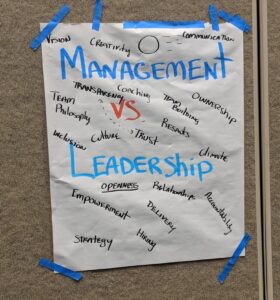 Addressing complaints is an essential part of a manager’s job. By keeping their finger on the pulse of what’s bothering people, managers can act as an early warning system for higher levels of management. By addressing their people’s concerns, managers can improve both productivity and morale. At the same time, facing an endless stream of criticism – often about things you can’t control – can be one of the most frustrating parts of being a manager. As a manager, you need the ability to listen to and learn from complaints without drowning in them.
Addressing complaints is an essential part of a manager’s job. By keeping their finger on the pulse of what’s bothering people, managers can act as an early warning system for higher levels of management. By addressing their people’s concerns, managers can improve both productivity and morale. At the same time, facing an endless stream of criticism – often about things you can’t control – can be one of the most frustrating parts of being a manager. As a manager, you need the ability to listen to and learn from complaints without drowning in them.
Leadership, People, and Change
Empowering Teams to Stay Out the Soup
 Teams rarely have a shortage of complaints. Most teams have plenty of ideas of what’s going wrong and numerous suggestions for addressing them. Noticing what’s getting in the way of great work is a sign of a healthy team. However, they often focus too much on what others can do to remove these obstacles. When teams ignore what they can do themselves, things rarely get better. One of my favorite tools for empowering teams is Circles & Soup.
Teams rarely have a shortage of complaints. Most teams have plenty of ideas of what’s going wrong and numerous suggestions for addressing them. Noticing what’s getting in the way of great work is a sign of a healthy team. However, they often focus too much on what others can do to remove these obstacles. When teams ignore what they can do themselves, things rarely get better. One of my favorite tools for empowering teams is Circles & Soup.
Asking for Clarity from Your Boss
 Working with other people is hard – for a variety of reasons. One of the promises of working together is that you can help each other to get things done. One of the biggest obstacles to doing this is not sharing a brain. Asking for clarity helps you avoid the trap of only thinking you know what someone wants. But all too often, when someone asks you for help or wants to delegate something to you, you can find yourself playing “Bring Me a Rock.”
Working with other people is hard – for a variety of reasons. One of the promises of working together is that you can help each other to get things done. One of the biggest obstacles to doing this is not sharing a brain. Asking for clarity helps you avoid the trap of only thinking you know what someone wants. But all too often, when someone asks you for help or wants to delegate something to you, you can find yourself playing “Bring Me a Rock.”
Helping Managers Manage (and Not Just “Lead”)
 “I want to be a people manager, but I don’t want to manage people.”
“I want to be a people manager, but I don’t want to manage people.”
We’ve never worked with anyone who has said this quite this clearly. Still, some managers we’ve worked with have been ambivalent about the work of management. They have been reluctant to use the authority that comes along with their role. This attitude is understandable, given how little emphasis we’ve seen in organizations on helping managers use it productively and humanely. It’s also problematic. When managers don’t fully inhabit their role, they struggle (and often fail) to set clear expectations, to give productive feedback, to communicate and sponsor effective change, and to support their managers.
Managing Up is about Partnership
 For a long time, “managing up” rubbed me the wrong way. The way that people frequently used the phrase brought to mind judgment, manipulation, and deception. It seemed rooted in a belief that your manager didn’t understand how work got done. Just as I thought “stakeholder management” involved carefully controlling your messaging to always make yourself look good, I believed that managing up was fundamentally unethical.
For a long time, “managing up” rubbed me the wrong way. The way that people frequently used the phrase brought to mind judgment, manipulation, and deception. It seemed rooted in a belief that your manager didn’t understand how work got done. Just as I thought “stakeholder management” involved carefully controlling your messaging to always make yourself look good, I believed that managing up was fundamentally unethical.
I was wrong. Managing up is about partnership.
Unpacking Your Manager Role
 Saying someone is a manager tells you little about what they do or where they spend their time. Different companies lay out these duties differently; managers within the same company (or department) sometimes have vastly different jobs. As a manager, having mismatched expectations about your role – particularly with your boss and peers – can have unfortunate results.
Saying someone is a manager tells you little about what they do or where they spend their time. Different companies lay out these duties differently; managers within the same company (or department) sometimes have vastly different jobs. As a manager, having mismatched expectations about your role – particularly with your boss and peers – can have unfortunate results.
Performance Feedback Requires Clear Expectations

“One of the people I manage is underperforming. I need to give them feedback about how they aren’t meeting expectations.”
I hear this often from managers, and I get curious whenever I do. The instinct behind it is good: Managers need to address underperformance. In my experience, however, giving performance feedback about unmet expectations is unlikely to help if you haven’t done your homework first. One of my teachers says, “80% of employee problems are due to manager neglect.” Whether you are a manager or not, when someone isn’t meeting your expectations, start by looking at what you’re doing – and what you’re not.
Navigating Team Conflict with the Waterline Model
 Conflict is a challenging topic for many people to navigate. It’s a natural part of working together in groups, yet in the midst of it, it can feel terribly dysfunctional. There’s no shortage of ideas about how to work through it, and there are lots of tools available. The choice of what tool to use when can feel overwhelming. How do you know where to get started? One of my to-go methods for engaging with conflict is the Waterline Model.
Conflict is a challenging topic for many people to navigate. It’s a natural part of working together in groups, yet in the midst of it, it can feel terribly dysfunctional. There’s no shortage of ideas about how to work through it, and there are lots of tools available. The choice of what tool to use when can feel overwhelming. How do you know where to get started? One of my to-go methods for engaging with conflict is the Waterline Model.
Retrospectives Are Real Work, Too
 “We don’t have time for a retrospective. We have ‘real work’ to do.”
“We don’t have time for a retrospective. We have ‘real work’ to do.”
How many times have you heard this? It comes up frequently in the classes I teach, I’ve heard it more times than I care to count. It frustrates me, and yet, I understand where it comes from. This issue isn’t limited to retrospectives. One of the challenges that managers, coaches, and consultants face is helping groups and teams to effectively balance productive work with work that builds and sustains their productivity. The key to that is understanding that working on the group’s functioning is also real work.
How Deep Do You Ask People To Go?
 Some of my most spectacular failures working with teams have come from going deeper than I needed to. One particularly memorable retrospective ended with a product manager declaring, “I’m done talking about my feelings.” (It was not my finest moment.) Yes, organizations are made of people. And yes, work happens inside a container of relationships. But that doesn’t mean every attempt to address a team or organizational problem must be super deep. Choosing the depth at which to intervene is critical for every manager, consultant, and coach.
Some of my most spectacular failures working with teams have come from going deeper than I needed to. One particularly memorable retrospective ended with a product manager declaring, “I’m done talking about my feelings.” (It was not my finest moment.) Yes, organizations are made of people. And yes, work happens inside a container of relationships. But that doesn’t mean every attempt to address a team or organizational problem must be super deep. Choosing the depth at which to intervene is critical for every manager, consultant, and coach.










